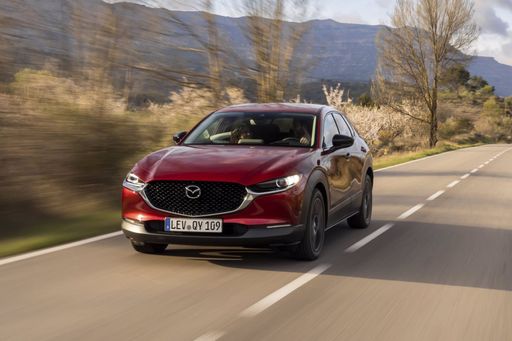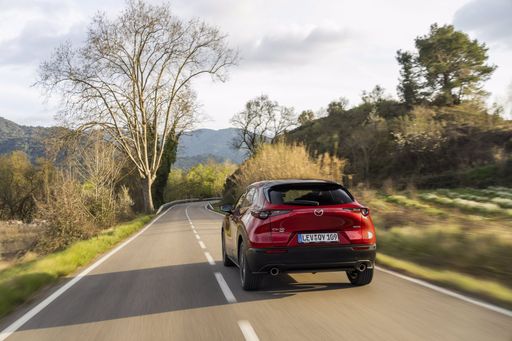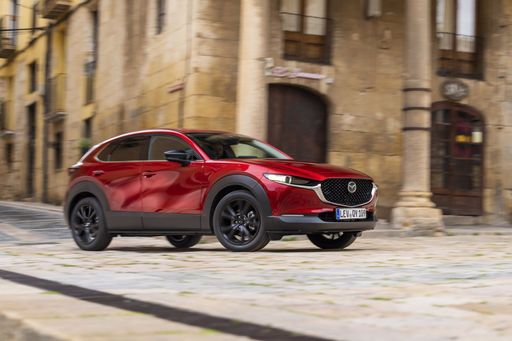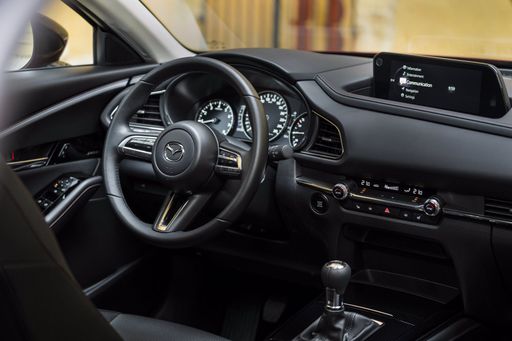Mazda CX-30 vs Toyota Yaris Cross - Differences and prices compared
Compare performance (186 HP vs 130 HP), boot space and price (25200 £ vs 23700 £ ) at a glance. Find out which car is the better choice for you – Mazda CX-30 or Toyota Yaris Cross?
Costs and Efficiency:
Price and efficiency are key factors when choosing a car – and this is often where the real differences emerge.
Toyota Yaris Cross has a minimal advantage in terms of price – it starts at 23700 £ , while the Mazda CX-30 costs 25200 £ . That’s a price difference of around 1543 £.
Fuel consumption also shows a difference: Toyota Yaris Cross manages with 4.50 L and is therefore evident more efficient than the Mazda CX-30 with 5.70 L. The difference is about 1.20 L per 100 km.
Engine and Performance:
Power, torque and acceleration say a lot about how a car feels on the road. This is where you see which model delivers more driving dynamics.
When it comes to engine power, the Mazda CX-30 has a distinct edge – offering 186 HP compared to 130 HP. That’s roughly 56 HP more horsepower.
In acceleration from 0 to 100 km/h, the Mazda CX-30 is noticeable quicker – completing the sprint in 8.30 s, while the Toyota Yaris Cross takes 10.70 s. That’s about 2.40 s faster.
Space and Everyday Use:
Cabin size, boot volume and payload all play a role in everyday practicality. Here, comfort and flexibility make the difference.
Both vehicles offer seating for 5 people.
In curb weight, Toyota Yaris Cross is evident lighter – 1180 kg compared to 1455 kg. The difference is around 275 kg.
In terms of boot space, the Mazda CX-30 offers hardly perceptible more room – 430 L compared to 397 L. That’s a difference of about 33 L.
When it comes to payload, Toyota Yaris Cross minimal takes the win – 510 kg compared to 496 kg. That’s a difference of about 14 kg.
Who wins the race?
The Mazda CX-30 proves to be is largely superior and therefore becomes our DriveDuel Champion!
Mazda CX-30 is the better all-rounder in this comparison.

Mazda CX-30
Costs and Consumption
View detailed analysis
Engine and Performance
View detailed analysis
Dimensions and Body
View detailed analysis
Mazda CX-30
The Mazda CX-30 blends sleek coupe-like lines with the practicality of a compact crossover, feeling more premium than its price tag suggests. It’s a joy to drive for anyone who likes a taut chassis and an interior that treats daily commutes like a small luxury escape.
details



Toyota Yaris Cross
The Toyota Yaris Cross takes the jaunty personality of the Yaris and gives it a taller stance and a bit more practicality, so you get city-friendly agility with added SUV presence. It’s easy to live with, economical on the daily grind, and smartly packaged — a sensible pick for buyers who want fuss-free transport with a touch of character.
details






Costs and Consumption |
|
|---|---|
|
Price
25200 - 36800 £
|
Price
23700 - 34300 £
|
|
Consumption L/100km
5.7 - 6.6 L
|
Consumption L/100km
4.5 - 4.8 L
|
|
Consumption kWh/100km
-
|
Consumption kWh/100km
-
|
|
Electric Range
-
|
Electric Range
-
|
|
Battery Capacity
-
|
Battery Capacity
-
|
|
co2
129 - 148 g/km
|
co2
101 - 108 g/km
|
|
Fuel tank capacity
-
|
Fuel tank capacity
36 L
|
Dimensions and Body |
|
|---|---|
|
Body Type
SUV
|
Body Type
SUV
|
|
Seats
5
|
Seats
5
|
|
Doors
-
|
Doors
5
|
|
Curb weight
1455 - 1587 kg
|
Curb weight
1180 - 1290 kg
|
|
Trunk capacity
422 - 430 L
|
Trunk capacity
320 - 397 L
|
|
Length
-
|
Length
4180 mm
|
|
Width
1795 mm
|
Width
1765 mm
|
|
Height
-
|
Height
1595 mm
|
|
Max trunk capacity
-
|
Max trunk capacity
1097 L
|
|
Payload
458 - 496 kg
|
Payload
485 - 510 kg
|
Engine and Performance |
|
|---|---|
|
Engine Type
Petrol MHEV
|
Engine Type
Full Hybrid
|
|
Transmission
Manuel, Automatic
|
Transmission
Automatic
|
|
Transmission Detail
Manual Gearbox, Automatic Gearbox
|
Transmission Detail
CVT
|
|
Drive Type
Front-Wheel Drive, All-Wheel Drive
|
Drive Type
Front-Wheel Drive, All-Wheel Drive
|
|
Power HP
140 - 186 HP
|
Power HP
116 - 130 HP
|
|
Acceleration 0-100km/h
8.3 - 10.3 s
|
Acceleration 0-100km/h
10.7 - 11.3 s
|
|
Max Speed
-
|
Max Speed
170 km/h
|
|
Torque
238 - 240 Nm
|
Torque
-
|
|
Number of Cylinders
4
|
Number of Cylinders
3
|
|
Power kW
103 - 137 kW
|
Power kW
85 - 96 kW
|
|
Engine capacity
1998 - 2488 cm3
|
Engine capacity
1490 cm3
|
General |
|
|---|---|
|
Model Year
2025
|
Model Year
2024 - 2025
|
|
CO2 Efficiency Class
D, E
|
CO2 Efficiency Class
C
|
|
Brand
Mazda
|
Brand
Toyota
|
What drive types are available for the Mazda CX-30?
The Mazda CX-30 is offered with Front-Wheel Drive or All-Wheel Drive.




